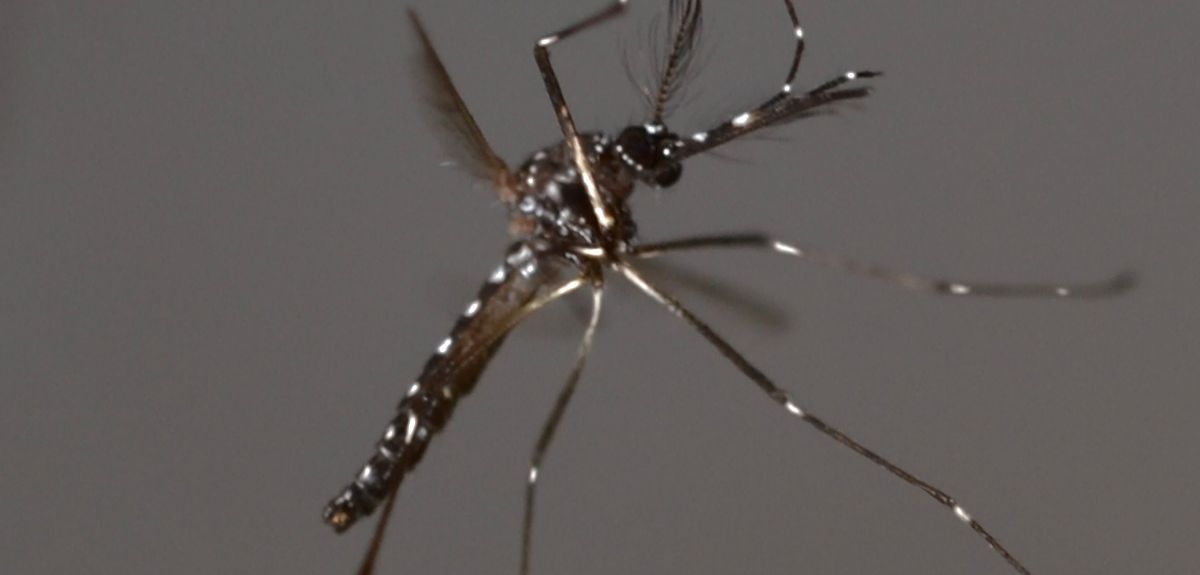
An Aedes Aegypti Mosquito, developed by Oxitec to combat dengue fever, in flight. Credit: Oxitec
Biotech spin-out to be sold for $160 million
US company to acquire pioneering GM insect control spin-out
Oxitec, a University spin-out developing new ways of controlling disease-carrying insects and pests, is to be sold to a major US corporation for US$160m.
Intrexon Corporation, a leader in synthetic biology, has agreed to acquire Oxitec, spun out from research in the Department of Zoology, in a deal worth £9 million to the University.
Oxitec was founded in 2002 by Zoology researchers, Luke Alphey and David Kelly. The company uses a genetic modification technique they invented, to design strains of insects which are incapable of reproducing effectively. These ‘sterile’ strains can be mass reared and then released into the wild, causing a population crash removing that particular insect species.
The technology has implications for the control of disease-carrying mosquitoes. The company has made significant progress in addressing dengue fever, which is carried by the Aedes aegypti mosquito and infects up to 390 million people worldwide every year. Trials in Grand Cayman, Brazil and Panama have all shown Aedes Aegypti population reductions of more than 90 per cent.
The modified Aedes aegypti mosquito is now the first GM insect approved as safe for use in Brazil. Oxitec has opened a factory in Brazil is waiting for commercial clearance to begin full scale production.
The technology can also be used to control agricultural pests which damage crops. Oxitec has just received approval for open field trials in Brazil and the USA for two strains to control the Mediterranean fruit fly and the Diamondback moth.
Oxford’s technology transfer arm, Isis Innovation, assisted with patenting the initial intellectual property, setting up the company and raising investment. Isis Innovation also invested £248k in seed funding from the Oxford University Challenge Seed Fund for proof-of-concept research.
The University increased its stake in the company through further investments by OSEM (Oxford Spin-out Equity Management). As a result of the sale, Oxford’s investments will return US$14.6m (£9.2m) to the University.
The Oxitec agreement follows last year’s successful sale of another Department of Zoology spin-out, NaturalMotion. US social games company Zynga acquired the digital animation company for more than US$527m, returning more than £30m to the University.
The Vice-Chancellor of Oxford University, Professor Andrew Hamilton, said: ‘Oxitec is an outstanding example of how the commercialisation of Oxford research can help address global problems. I have been to the company’s factory in Brazil and seen for myself the potential it has to tackle the suffering caused by dengue fever. The £9 million return to the University is an endorsement of our technology transfer strategy and our policy of continued investment in our most successful spin-outs.’
Intrexon Chairman and Chief Executive Officer Randal J. Kirk said: ‘Oxitec’s technology demonstrates that engineered biology can solve some of mankind’s most difficult problems – many that have eluded solutions for a very long time – while exercising tremendous respect for the environment.’
Oxitec’s Chief Executive Officer Hadyn Parry said: ‘We are excited to be joining with Intrexon and see this partnership as key to developing sustainable solutions to some of the world’s most intractable health and agriculture problems and making them available on a global basis.’
 New research reveals shared genetic link between endometriosis and immune conditions
New research reveals shared genetic link between endometriosis and immune conditions
 Learning centre celebrates 10 years working with young people in Oxford
Learning centre celebrates 10 years working with young people in Oxford
 Expert Comment: The point of the pope. Why His Holiness matters (even if you’re not a Catholic)
Expert Comment: The point of the pope. Why His Holiness matters (even if you’re not a Catholic)
 Child heart disease found to be more likely if mother has anaemia during pregnancy
Child heart disease found to be more likely if mother has anaemia during pregnancy